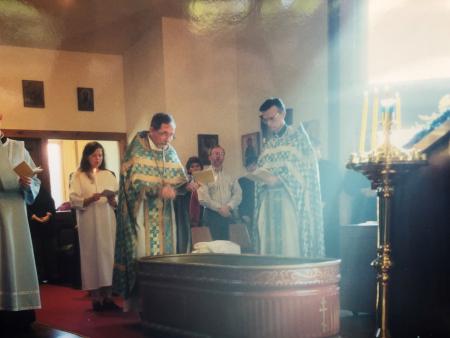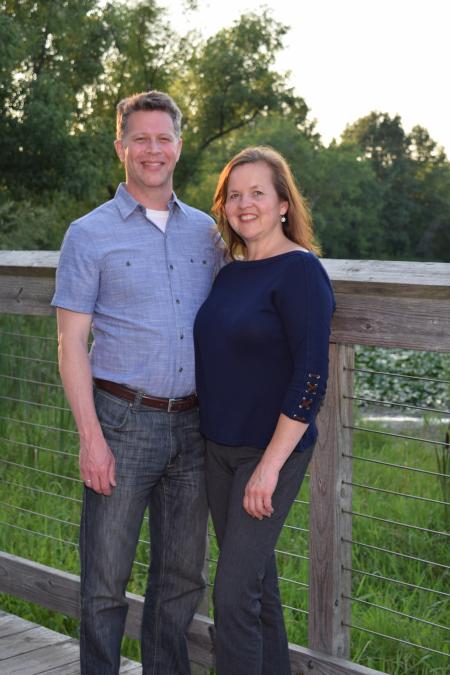Hollie and Rich Benton with dauthters Nellie and Kalista
Hollie Benton (SVOTS’ class of 1999) has served as executive director of the Orthodox Christian Leadership Initiative (OCLI) since September of 2019. From its inception, the extensive collaboration between OCLI and St. Vladimir’s Seminary has been of benefit to both. The two organizations have partnered to co-host four groundbreaking national conferences on leadership; the fifth annual conference this September will be a hybrid option, available both online and in-person featuring the theme, “Generously Investing in Emerging Leaders.”
Saint Vladimir’s President The Very Rev. Dr. Chad Hatfield is on the advisory board of OCLI, and he and SVOTS professor The Very Rev. Dr. Sergius Halvorsen were involved in developing the Doulos and Servant Leadership programs. OCLI is also helping the Seminary develop a leadership emphasis within the Master of Arts hybrid program. "SVOTS and OCLI are a natural pairing,” explains Fr. Chad, “as both are centered on servant leadership and our Orthodox Christian need for both a theological understanding of what this is, and the application to our needs in Orthodoxy today. I am proud that one of our own alumna is the driving force behind OCLI."
Hollie’s background is a diverse and unique blend that includes service in Orthodox Christian ministries, professional IT roles, and music-making. In her tenure at Ecolab, she held multiple titles: project manager, product owner, and Operations Manager of a large team in the Commercial Solutions division.
Hollie studied music theory and piano in college, and she directs the choir at St. Elizabeth Orthodox Church in St. Paul, MN, where she is a member. Her musical background includes a year teaching abroad in Bucharest, Romania. Hollie and her husband, Richard Benton, PhD (also from SVOTS’ class of 1999), served with Orthodox Christian Fellowship (OCF) for ten years in regional capacities and at the University of Wisconsin-Madison, University of Washington-Seattle, and University of Minnesota, -Twin Cities. Her family has hosted international exchange students from Spain, Serbia, Georgia, and Bosnia, and daughters Nellie and Kalista have studied or will study abroad in Bosnia, Macedonia, Spain and the Netherlands.

Hollie, can you give us a snapshot of your background?
The first thing that comes to mind is that I was baptized at the Seminary! I might have been one of the first adults baptized there. A student had to secure a painted horse trough in preparation, Fr. Thomas Hopko and Fr. Paul Lazor performed the sacrament, and Matushka Anne Hopko made my baptism garment. She was so sweet to me; after Rich and I were engaged at the Seminary, she helped me with my wedding dress.
Religiously, I grew up as a Nazarene and attended Northwest Nazarene College. After graduation I went to Romania for missions work, teaching in an international school and helping with other ministries. It was there that I learned about the theologian Fr. Dumitru Stăniloae and began to develop an interest in Orthodox Christianity. I was in Romania for Pascha in Bucharest and of course, that left a lasting impression.
Returning to Idaho, I couldn’t find an Orthodox Church near me. I was also interested in studying theology, so I called St. Vladimir’s and they told me to consult with Fr. George Gray a wonderful OCA priest serving in Portland. My visit to his parish, St. Nicholas, was my first Orthodox service; in fact, I walked to the back of the church when the priest announced, “Catechumens, depart!” I thought I was supposed to leave!
Father George at St. Nicholas was really kind and helpful. He interviewed me and was my referral for St. Vladimir’s. I packed up my car and drove across the United States to New York to attend seminary. I was 24 years old!. Father Paul Lazor catechized me and I learned so much in my classes, especially from Fr. Paul Tarazi.
While all this was going on, I also started dating a fellow seminarian, Rich Benton. Longtime employee Ann Sanchez would let the single guys know who the female students were. That year she said to them, “The crop is thin, fellas.” Despite this, Rich was clued in that I was there. By accident, he got me on the phone in the women’s dorm the day I arrived and that’s how we first connected.
I was a catechumen for about a year. My family felt very threatened by my conversion, so Fr. Paul advised me to respect my family and give them time to adjust to my interest in Orthodoxy. After a year, on the Feast of the Entrance, I was baptized and chrismated. I took part in the history of St. Vladimir’s that day, since this was also the day they broke ground for the Rangos Building!
I completed a two-year degree while Rich finished a three-year degree. Before we decided to marry, however, Rich had met a monk from Mt. Athos who invited him to his monastery so he went there for a time to seek out his next steps. When he came back, he asked me to marry him.
After Commencement 1999, Fr. Paul Lazor married us in Idaho. Only a handful of Orthodox people attended our wedding, so in a sense we “missionized” our wedding guests at the reception, explaining why it was that the rings had been placed on our right hands, and what the symbolism in the sacrament conveyed. It was a wonderful opportunity to share our Orthodox Christian faith with people.
What did you take away from your time at SVOTS?
I experienced this paradigm shift: while I had freedom to choose or reject Christianity, the rite of baptism shows that my choice is insignificant compared to the Lord who chooses to show great mercy and the forgiveness of sins. I can only submit to His will found in His commandments. Everything was reframed for me so that I saw myself as under that authority. What we hear from the world right now is “You be YOU, find YOUR voice, dig down deep into what you want and who you are.” But God provides all that we need through His life-giving Word if we’d only submit. Everyone is a slave to something. If you can name what you are afraid of, what you are angry at, what you desire, or what keeps you up at night, those are your masters. By contrast, Christ’s yoke is easy and His burden is light. So why not serve him rather than be enslaved by our fears and our own egos? At St. Vladimir’s, I began to learn what it means to function as a servant in God’s household laid out clearly in Fr. Paul Tarazi’s classes.

Why do you and Rich give to SVOTS?
We feel it’s our responsibility. We need to raise up men and women who are educated, who take scripture seriously, and who take their ministry seriously. It’s important to support those who are giving of their time and energy to be educated. Why not support that work and carry the burden together?
What happened post-seminary?
My husband started his Ph.D. program in Biblical Hebrew in Madison, Wisconsin and we got very involved in OCF. I poured a lot of energy into having students over, including many international students. I taught piano, and we had two daughters.
Then Rich’s post-doctoral studies were in Seattle—he taught and studied around the topics of Jewish history and culture. In 2012 a lot of the Old Testament teaching positions were shutting down at universities, so we decided to move to the Twin Cities area because a lot of our friends were living there. Through the help of a seminary colleague, Fr. Marc Boulos, we both wound up working for Ecolab in IT.
What drew you to your current leadership position with OCLI?
Dr. Ann Bezzerides [director of the Office of Vocation & Ministry, Hellenic College Holy Cross Greek Orthodox School of Theology] and I were classmates at SVOTS and we’d kept in contact. She was in touch with those who were creating the Orthodox Christian Leadership Initiative, and they liked my combination of corporate experience and seminary training. I had done a lot of leadership development at the corporate level and had run a mentoring program on a local level for OCF.
Incidentally, I credit my dad with the “get it done” attitude. When you grow up on a farm, you imbibe this strong sense that nothing is impossible with a little resourcefulness and stubborn persistence.
From your perspective, what is most needed in the Church today, and what part does SVOTS play in that?
At St. Vladimir’s, there is a lot of emphasis on forming leadership. We are all called to be servants of God—not just the priest who is our “stand-in servant.” We have a duty to the greatest commandments—loving God and neighbor. Christian leadership is not about developing personal influence and authority; it’s about submitting to the ONE Leader. God the Father is the only true authority and His Word has the only lasting influence. The only kind of Christian leader is one who serves to carry out His Father’s will just as the Son of God, Jesus Christ, demonstrates.
And by loving God, we learn what it means to submit to one another in love.. Quite intentionally we called our program DOULOS, which means “slave” or “servant” in Greek. Every time we receive communion, we are reminded that the doulos tou theou, or “the servant of God receives the body and blood of Jesus Christ.” In order to submit to God’s instruction we need to turn our ears towards it; people need to be encouraged to pay attention to scripture proclaimed in liturgical services. You go to scripture so that it can search you and form you. It’s back to basics, isn’t it? We hear “leadership” and we think of hip motivational speakers and innovation, but really it’s all laid out for us already: submission to Him and to one another in love. When we allow the scriptures to search us and form us, it’s so powerful. Imperfections bubble up and if we have the humility to acknowledge and confess them we can function properly as the Body of Christ.
The DOULOS program for parishes is built on these same principles. The idea around this is that parish leadership hearkens to the Lord’s vision and then commits to implementing it together as the Body of Christ in its local context, lay and clergy alike. OCLI doesn’t just dump the content and run, either: there’s a built-in accountability structure. As the parish plan emerges from the initial workshop, the parish health coach checks in regularly to support the implementation of that plan.
Can you say a word for the value of seminary for those who aren’t on the ordination track?
I can speak for myself, since my undergrad was in philosophy and music and as a woman I wasn’t preparing for ordination. For me St. Vladimir’s was all about the academic rigor, working through difficult texts, learning how to lay out the arguments, and seeking the Lord’s instruction. And because of the hectic schedule, it’s also a time when you learn how to keep your priorities straight and stay balanced.
When you are formed within the St. Vladimir’s community you learn to understand people a lot. Somewhat paradoxically, I did well at my corporate job due to my seminary education and I succeeded in corporate management because of my seminary experience. In our years at St. Vladimir’s, we didn’t have the luxury of asking, “what do I feel like doing right now? Who do I feel like loving?” The people skills I picked up at seminary have been invaluable in both my corporate and ministry work.
At St. Vladimir’s I gained a deep sense of what’s important: focus, compassion, worship, scripture, and love in service to God and neighbor.
Learn more about the Orthodox Christian Leadership Initiative and its programs, events, and initiatives at orthodoxservantleaders.com.